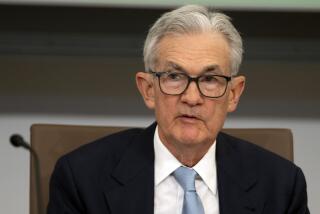Boskin Advises West Germany to Avoid Rate Hike
WASHINGTON — The White House’s chief economist urged the West German central bank Thursday not to boost interest rates as part of its strategy for coping with economic integration with East Germany.
The comments by Michael J. Boskin, chairman of the White House Council of Economic Advisers, reflected widespread concerns here that any further increase in West German rates would quickly cross the Atlantic, damaging prospects for a rebound in the sluggish U.S. economy.
Interest rates in Europe soared early this year as the political and economic turmoil caused by the rush to unify East and West Germany left investors both nervous about the prospects for inflation and eager to take advantage of a potential capital investment boom. Because markets around the globe are linked by virtually instantaneous communication, rate increases here promptly echoed those in Europe.
“If you’re a home buyer, you don’t care if the pressure comes from home or abroad,” said Allen Sinai, chief economist at Boston Co., an economic consulting group. “The bottom line is higher interest rates.”
Boskin, in a breakfast with reporters, acknowledged that upward pressure on West German interest rates will continue.
The cause, as it often is in the United States, is inflation. East Germany is about to adopt the West German currency. Almost certainly, East Germans will be able to convert their cash to West German marks at a favorable exchange rate, designed to show them that they can look forward to prosperity if they stay home instead of moving to the West.
The sudden large increase in money and the resulting demand for goods will inevitably drive prices up in both Germanys.
Some officials at the West German central bank, the Bundesbank, believe that the proper response is to force interest rates up. That is the same sort of bitter medicine imposed by former Federal Reserve Chairman Paul A. Volcker that worked to end the inflationary spiral in the United States a decade ago.
But Boskin argued strongly against such an approach. West Germany will experience nothing more than a temporary inflation shock, he said, and after that, prices should level off.
“The worst thing they could do is to tighten and cause a recession,” Boskin said. “There’s no reason a one-time price hike should lead to a wage-price spiral.”
Boskin’s message to the West Germans was unusually blunt. Administration officials have generally shied away from talking publicly about German economic policy since then-Treasury Secretary James A. Baker III rattled investors with tough comments on the subject just before the October, 1987, stock market crash.
The West Germans “shouldn’t be tightening in anticipation of worrying about a temporary increase in prices,” Boskin said. “They should accommodate it.”
He said that folding the Communist system in East Germany into West Germany’s vibrant capitalist economy--a move that is likely to accelerate sharply after East Germans go to the polls March 18--is like “buying an asset with a huge potential future.”
Germany’s independent central bank, Boskin said, should simply accept the “one-time price increase” that will result from currency unification. “That would be better for the German economy,” he said, “as well as putting less pressure on interest rates elsewhere.”
Many U.S. economists are worried that continued uncertainty over how West German officials plan to handle the thorny issues of economic integration and widespread anticipation of a flood of capital into Eastern Europe will continue to drive interest rates up in Europe and the United States.
In recent days, U.S. officials and outside analysts have argued that such fears may be overblown. Federal Reserve Chairman Alan Greenspan told lawmakers last week that financial markets probably have already adjusted to anticipated changes. Indeed, the German bond market pulled out of its tailspin slightly more than a week ago.
John Hekman, an economist at Claremont Economics Institute in Southern California, believes that investors “overreacted to the immediate threat of inflation in Germany.” But even if interest rates remain high in Germany, Hekman thinks U.S. rates will gradually recede as investors return money to Wall Street in the belief that they can earn a greater real return over the long run from U.S. bonds than from West German securities.
Hekman acknowledged that the American economy is becoming increasingly vulnerable to developments abroad.
“It’s remarkable how much U.S. markets were pushed around by events in Germany and Japan,” he said. “We’ve been talking for years about the integration of global financial markets. Now we see the results.”
More to Read
Inside the business of entertainment
The Wide Shot brings you news, analysis and insights on everything from streaming wars to production — and what it all means for the future.
You may occasionally receive promotional content from the Los Angeles Times.










